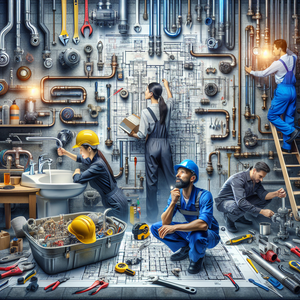
Exploring the Varied Career Paths in Plumbing: Roles, Responsibilities, and Requirements
The plumbing sector is a broad and complex field that encompasses numerous specialties tailored to meet the distinct demands of residential, commercial, and industrial clients. For anyone contemplating a career in this essential trade, understanding the different types of plumbers is crucial. Each role, from residential to industrial plumbing, comes with its own set of responsibilities and skill requirements. As the need for plumbing services continues to grow, gaining insight into these diverse career paths can help aspiring plumbers match their interests and skills with suitable opportunities. In this article, we will delve into the various types of plumbers, their job functions, qualifications, and the current landscape of the job market.
Job Summaries:
Residential Plumber:
- Residential plumbers concentrate on installing and fixing plumbing systems in homes.
- Their duties include repairing leaks, clearing drains, and setting up household appliances like sinks and water heaters.
- Generally, a high school diploma, completion of an apprenticeship, and a state license are required.
- Their work is crucial for ensuring the safety and functionality of household plumbing systems, directly influencing homeowners’ quality of life.
- With the housing market on the rise, there is an increasing demand for residential plumbers.
Commercial Plumber:
- These plumbers specialize in plumbing systems for businesses such as offices and schools.
- They handle larger projects and must be well-versed in plumbing codes and regulations.
- A high school diploma, successful apprenticeship completion, and specialized training in commercial plumbing systems are typically required.
- Their expertise is vital for the smooth operation of commercial facilities, impacting overall business efficiency and safety.
- Demand for commercial plumbers is growing, especially in urban environments.
Service and Repair Plumber:
- Service and repair plumbers are the first responders to emergencies.
- They troubleshoot issues like burst pipes and clogged drains.
- A high school diploma and relevant certification are usually necessary.
- Their prompt resolutions are essential for maintaining plumbing systems.
- They ensure customer satisfaction.
- The need for skilled service and repair plumbers remains steady.
- This makes it a reliable career choice.
Sanitary Plumber:
- Sanitary plumbers focus on waste and sewage systems, particularly drainage systems to avert contamination.
- A high school diploma and specialized training in sanitary plumbing are required.
- Their role is critical for public health, helping to prevent sewage-related challenges that can affect communities.
- Stricter sanitation standards are driving an increase in demand for sanitary plumbers.
Construction Plumber:
- These plumbers play a key role in new construction projects.
- Installing plumbing systems from the ground up.
- Collaborating with contractors and architects.
- A high school diploma and apprenticeship experience are generally required.
- They ensure that new structures incorporate safe and efficient plumbing systems in line with the overall design.
- Ongoing construction across various sectors is fueling demand for construction plumbers.
Industrial Plumber:
- Industrial plumbers work in factories and manufacturing plants, managing intricate plumbing systems that often involve hazardous materials.
- A high school diploma and specialized certification in industrial plumbing codes are typically necessary.
- Their expertise is essential for maintaining safety and efficiency in high-demand industrial environments.
- The growth of the industrial sector is increasing the need for skilled industrial plumbers.
Pipefitter:
- Pipefitters specialize in piping systems that transport gases and liquids.
- They work in both industrial and commercial contexts.
- A high school diploma, apprenticeship, and specific certifications are often required.
- They ensure that piping systems are leak-proof and adhere to safety regulations.
- Demand for pipefitters remains strong, particularly in sectors needing complex piping solutions.
Gas Fitter:
- Gas fitters install and repair gas lines and appliances, ensuring compliance with safety standards.
- Specialized training and certification are required due to the risks associated with gas systems.
- Their work is essential for the safe use of gas in both residential and commercial settings.
- The increasing reliance on gas appliances keeps the demand for qualified gas fitters steady.
Plumbing Technician:
- Assisting licensed plumbers
- Perform routine maintenance and troubleshooting
- Sometimes focusing on specific areas like water heaters
- A high school diploma and on-the-job training are usually required
- Play a crucial supportive role in ensuring plumbing systems function effectively
- The technician role serves as an entry point into the plumbing industry
- Ample opportunities for advancement
Licensed Master Plumber:
- Master plumbers oversee projects.
- They mentor apprentices.
- Ensure compliance with plumbing codes.
- Extensive experience and training are required.
- Passing a licensing exam is necessary.
- They uphold industry standards.
- Manage complex installations.
- Ensure quality across the plumbing field.
- Demand for skilled professionals is increasing.
- Master plumbers are becoming increasingly sought after.
The plumbing industry provides a wealth of career paths, each with unique responsibilities and requirements. By understanding the various types of plumbers, aspiring professionals can make informed career choices that align with their skills and interests. The market for plumbing services continues to expand, creating numerous opportunities for skilled plumbers. For those interested in pursuing a plumbing career, staying informed about job openings and industry trends is vital. Take the first step towards a rewarding plumbing career by exploring current job opportunities and gaining insights into this essential trade.
Explore More JobsRecommended Articles
Unveiling the Spectrum of Pharmacy Careers: A Deep Dive into Roles, Responsibilities, and Opportunities
Exploring the Landscape of Product Management and Ownership: A Comprehensive Guide to Roles, Responsibilities, and Career Paths
Exploring Career Paths in College Football: Key Roles and Responsibilities in the NCAA Arena